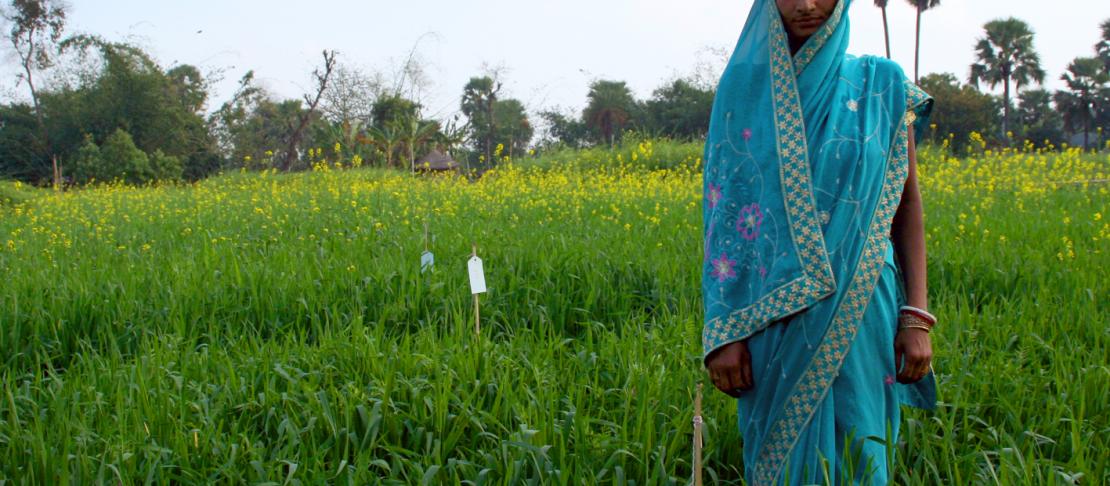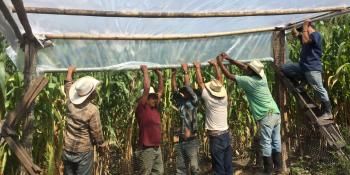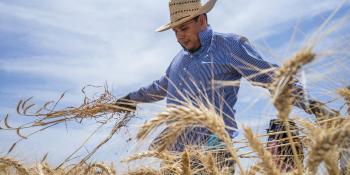Farmers become citizen scientists: Testing wheat crops for climate change adaptation

by Jacob van Etten
“So we pulled out the radishes!” We are standing next to a plot with three different wheat varieties in a CCAFS-led Climate-Smart Village in Vaishali district, India. Farmers here are testing out wheat varieties we supplied to them through a climate change adaptation project. “The wheat seeds arrived late, but we still wanted to test them. So we made the space.”
During our visit to Vaishali, it was clear that farmers liked the new wheat varieties.
In Bihar, Bioversity International is working with several partners, including the Indian Agricultural Research Institute (IARI), the IFFCO Foundation, and small local organizations, on Seeds4Needs, a series of projects that are trying to give farmers more access to crop varieties and landraces to help them adapt to climate change. Having several varieties can help farmers mitigate climate risk. For example, wheat is particularly sensitive to extreme heat when it flowers, so by having an early as well as a late variety, different flowering periods increase the likelihood that a short heat period will only affect one variety. Furthermore, having a constant stream of different varieties reaching farmer’s fields will help identify the best varieties for local conditions, and kickstart the adaptation process to any ongoing change in climate. Seeds4Needs is about identifying suitable crop genetic materials and bringing them to farmers’ fields.
Our trials last year had a lot of success, generating a lot of interest from farmers to participate. This year, even though the wheat was still not mature, farmers were already impressed by the new varieties. They especially liked that the plants had a lot of side shoots (tillers) and an intense green colour.
But a new twist has been added to the trials. In 2012, we started an innovative approach to test the varieties: Crowdsourcing crop improvement. The idea behind this approach is to involve farmers massively in evaluating varieties as citizen scientists. Each farmer grows a combination of three varieties drawn from a broader set of ten. The farmer then ranks them according to different characteristics such as early vigour, yield, and grain quality. The idea is to make things as easy as possible for the farmers, and then we, the researchers, use some nifty statistics methods to combine the rankings and share the results with the farmers. With this information, farmers can then identify the best varieties for their conditions and preferences. Farmers become citizen crop scientists, actively contributing to science with their time, effort and expertise. In India, 800 farmers are now testing wheat varieties as citizen scientists.
Seeds for Needs: Climate-proofing agriculture by optimizing crop variety use
It was a lot of fun to visit the plots and talk with the farmers. Each plot had its own little story: wheat growing in an orchard or next to a cooperative, women’s groups getting involved... One thing we want to test is whether this approach is more cost-effective and less complicated than the usual demonstration plots or participatory variety trials. In the new setup, logistics are less complicated because the seed comes to the farmer and the farmer doesn’t come to the demonstration plot. As the plots are smaller (with only 3 varieties from 120 grams of seed), they are easier to accommodate. In the extreme case, you can always just pull out the radishes! Also, the varieties farmers are testing have become the new favorite topic for neighbourly talk, as farmers feel they are fully involved in the discovery process. We are also starting to test if farmers can report back their results using a mobile telephone.
An important aspect of the work is that we work with national and local organizations. The real litmus test is to see if the approach will be picked up by our partners after their first experience with it. In Vaishali, our partner organizations liked the approach a lot. They found it practical to do and clearly saw its value for getting varieties to farmers. They were however, a bit worried about how scientific all of this was. I trust that after going through the whole cycle with them (including applying the nifty statistics methods I mentioned above), they will be more confident about the scientific value of the exercise. And if the approach is successful, we would not only make the crop improvement process cheaper, but also faster, which is needed given the speed of climate change. The crowdsourcing approach could make it possible to scale out this effort to even larger areas, involving thousands of farmers, increasing productivity and decreasing climate risk. Encouraged by the experience in Vaishali, we will be starting similar tests in East Africa and Central America later this year.
Jacob van Etten is a Senior Scientist at Bioversity International, leading the Climate Change Adaptation team. You can also follow Seeds4Needs on Twitter, and read more on our blog.


